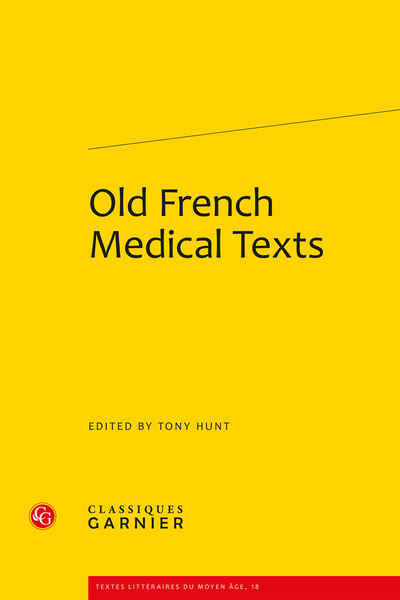
Preface
- Type de publication : Chapitre d’ouvrage
- Ouvrage : Old French Medical Texts
- Pages : 7 à 8
- Collection : Textes littéraires du Moyen Âge, n° 18
- Thème CLIL : 3438 -- LITTÉRATURE GÉNÉRALE -- Oeuvres classiques -- Moyen Age
- EAN : 9782812445149
- ISBN : 978-2-8124-4514-9
- ISSN : 2261-0804
- DOI : 10.15122/isbn.978-2-8124-4514-9.p.0007
- Éditeur : Classiques Garnier
- Mise en ligne : 29/07/2008
- Langue : Français
PReFACE
The Old French medical texts edited in these pages have not been published before. The volume represents an extension of my study of Anglo-Norman Medicine, once again instigated by the extraordinary failure of scholarship to follow up the leads so painstakingly provided by Paul Meyer, particularly in his “Manuscrits médicaux en Français”, Romania 44 (1915-17), 160-214 which deals with continental French manuscripts and was invoked by me in “Old French Translations of Medical Texts” which appeared in Forum for Modern Language Studies 35 (1999), 350-57. The thought that another century might elapse before any continuation of Meyer’s pioneering work was undertaken seemed too painful to contemplate. This study is therefore an attempt to initiate such a process and to promote greater understanding of the history of the vernacularization of medicine1, particularly in France. I am mindful of the valuable, editorial contributions of Östen Södergård and of the vast knowledge, merely glimpsed, in the articles of Mme Claude de Tovar. Would that these scholars, in turn, had received their due. As in my earlier publications on medical treatises, I have put the editing of texts before the task of preparing any discursive account or synthesis, since the time is not yet ripe for such a project. As it is, in medical history there are too many opinions based on too few materials. Of the vernacular texts contained in the Wellcome manuscript I have not edited the version of Aldobrandino’s Régime du corps, since a full edition exists and there seemed little point in transcribing what is an abbreviated text of little independent value. Investigation of the manuscripts of the Régime, notably by Mme Françoise Fery-Hue, continues. I 8have excerpted the treatise on urines from the medical compendium of which it seems to be part and given it a chapter (see below ch.2) to itself, since it has never been accurately identified or discussed. In the preparation of this study for publication I am deeply grateful for the kind assistance of Prof. Yan Greub and Prof. Richard Trachsler and the permission of the Wellcome Library.
1 I am mindful of the excellent and ambitious example set by M. Teresa Tavormina and her team of contributors to Sex, Aging, and Death in a Medieval Medical Compendium: Trinity College, Cambridge MS R.14.52, its texts language and scribe, Medieval and Renaissance Texts and Studies 292 (Tempe, Arizona: Arizona Center for Medieval and Renaisance Studies, 2006).